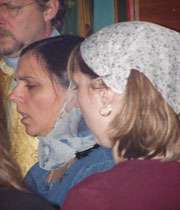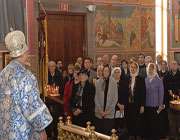The Word hijab (Modest Dress)
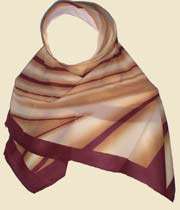
Before we begin our discussion, it is necessary to look at the meaning of the word hijab which is used in our age to refer to a woman's covering. This word gives the sense of 'covering' because it refers to a veil or a means of 'covering'. Perhaps it can be said that because of the origin of the word, not every covering is hijab. That 'covering' which is referred to as a hijab is that which appears behind a curtain. The Holy Quran describes the setting of the sun in the story of the Prophet Solomon,
"...until the sun was covered (bil hijab) and time for the afternoon ritual prayer was over." (38:32).
The diaphragm separating the heart from the stomach is also called 'hijab'.
The use of the word satr, in the sense of 'covering' was used instead of hijab, especially by the religious jurisprudents. The religious jurisprudents, whether in the section on the ritual prayers or in the section on marriage, refer to this issue and use the word satr and not hijab.
It would have been best if the word had not been changed and we had continued to use the word 'covering' or satr because, as we have said, the prevalent meaning of the word hijab is veil. If it is to be used in the sense of 'covering', it gives the idea of a woman being placed behind a curtain. This very thing has caused a great number of people to think that Islam has wanted women to always remain behind a curtain, to be imprisoned in the house and not to leave it.
The duty for covering, which has been established for women in Islam, does not necessarily mean that they should not leave their homes. It is not the intention of Islam to imprison women. We may find such ideas in the ancient, pre-Islamic past of some countries like Iran or India but no such thing exists in Islam.
The philosophy behind the hijab for woman in Islam is that she should cover her body in her associations with men 'whom she is not related to according to the Divine Law' (na-mahram) and that she does not flaunt and display herself.
The verses of the Holy Quran which refer to this issue affirm this and the edicts of the religious jurisprudents confirm it. We will refer to the extent of this covering by using the Quran and the Sunnah as sources. The relevant verses do not refer to the word hijab. Verses which refer to this issue, whether in Surah Nur (Chapter 24) or Surah Ahzab (Chapter 33), have mentioned the extent of the covering and contacts between men and women without using the word hijab. The verse in which the word hijab is used refers to the wives of the Holy Prophet of Islam.
We know that in the Holy Quran there are special commands about the Prophet's wives. The first verse addressed to them begins,
"O wives of the Prophet! You are not as other women..." (33:32).
Islam held the special relationship of the wives of the Prophet in such a great esteem that they were to remain at home for basically political and social reasons during the lifetime of the Holy Prophet and after his death. The Holy Quran says directly to the wives of the Prophet,
"Remain in your houses." (33:33).
Islam desired that the honor and respect of these 'Mothers of the Believers', who were held in great respect by the Muslims, not be misused and that they do not become a political and social tool for selfish and ambitious men.
The verse in which the word hijab is used is,
"...and when you ask his wives for any object, ask them from behind a curtain (hijab)..." (33:53).
According to history and Islamic tradition, when ever you see the 'verse of hijab' referred to, for instance, "such and such was the case before the revelation of 'the verse of hijab" " or "such and such was the case after the revelation of 'the verse of hijab"", it refers to this verse which relates to the wives of the Prophet and not the verses of Surah Nur which states,
"Say to the believing men that they cast down their glance and guard their private parts. That is purer for them. Surely God is Aware of what they do. And say to the believing women that they cast down their glance..." (24:3S31).
Or the verse of Surah Ahzab which states,
"O Prophet! Say to thy wives and daughters and the believing women that they draw their outer garments (jilabib) close to them. So it is more likely that they will be known and not hurt. God is All-forgiving, All-compassionate." (33:59)
But there is a question as to why, in the recent era, the current expression of the religious jurisprudents, that is, satr, did not become prevalent instead of hijab? The reason is unknown. Perhaps they mistook the Islamic hijab for the hijab which is traditional in other countries. We will give further explanation about this later articles.
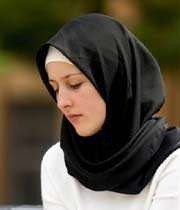
We will begin our discussion with the verses from Surah Nur. Of course the verses which relate directly to the modest dress are verses 30 and 31 of Surah Nur but there are three verses before this which are more or less introductory to the modest dress and relate to this issue.
The Command to Announce Your Entrance to Someone"s House
"O believers, do not enter houses other than your houses until you first ask leave and salute the people thereof; that is better for you; haply you will remember." (24:26)
This verse describes the duty of a man who is not mahram, to the house of another person, that is, the house of a person whose wife is not mahram to him. Of course, there are rules regarding those who are mahram and we will mention them later. Also there are some places where it is not particular to those who are mahram. It relates to what a person who wants to enter the house of another should do.
It was not the custom among Arabs in the Age of Ignorance to announce that they wanted permission to enter. They felt it was an insult to seek permission to enter. The Holy Quran says in another verse, “If you go and seek permission and it is not granted, return." This may be considered to be an insult by some but this emphasis in the Holy Quran is one of the introductory aspects of the modest dress because every woman in her own home is in a situation that she does not want to be seen or she does not want to see a person. A verse was revealed. "And when you ask his wives for something, ask them from behind a curtain (hijab)."(33:54)
When the Holy Prophet would enter, he would stand behind the door of the room in a place where they could hear his voice and would call out, "As-salam alaykum ya ahl al-bayt" ("Peace be upon you oh household of the Prophet"). He said, "If you hear no answer, perhaps the person did not hear you. Repeat it again in a loud voice. Repeat for a third time if you receive no response. If, after the third time that you announce yourself, you hear no response, either that person is not home or the person does not want you to enter; return." The Holy Prophet did this and many stories have been narrated about this, such as when he wanted to enter his daughter"s house, he would call out salutations in a loud voice. If she responded, he would enter. If he called out three times and received no response, he would return.
"This is purer for you." That is, the commands We give are better for you, contain goodness, are not illogical. "Know that this is good."
"And if you do not find anyone therein, enter it not until leave is given to you and if you are told "return"; that is purer for you; and God knows the things you do." (24:27)
"There is no fault in you that you enter uninhabited houses wherein enjoyment is for you. God knows what you reveal and what you hide." (24:28)
This was very difficult for the Arabs to understand. To seek permission when they wanted to enter a house was itself difficult and then to be told to return and then to actually do so, was next to impossible. It was an insult.
In the verse, "there is no fault in you...", an exception arises. Does this ruling apply whenever one wants to enter anyone"s home or only a person"s residence. The Holy Quran says this is not a general ruling and only applies to someone"s home.
A home is a place of privacy, the place of one"s private life. If this were not so, there would be need to seek permission. If there is, for instance, a caravanserai and you have business, do you have to seek permission, etc? No. Here it is not necessary to enter by seeking permission. What about a public bath? There is no need here. "There is no fault in you..." if it is not a place of residence in which you have business."God knows what you reveal and what you hide."

From the word, "uninhabited", one can understand that the philosophy of why a person cannot enter the home of another without announcing it first is because of the wife as well as the fact that the home is the place of one"s privacy. Perhaps there are things which one does not want someone else to see.
Thus, when a person enters the privacy of another"s home, the entrance must be announced. A person must, in some way, announce that he wants to enter even if the person knows that the other has allowed him to enter. He is your friend. He knows that you are going to enter. You know that he is totally in agreement with your entering. Still, you should realize that you are entering upon his privacy.
The Command to "cast down their glance", "to Guard Their Private Parts" and "not to reveal their adornment"
"Say to the believing men that they cast down their glance and guard their private parts; that is purer for them. God is aware of the things they do." (24:30)
"Say to the believing women that they cast down their glance and guard their private parts and reveal not their adornment except such as is outward and let them cast their veils (khumar) over their bosoms and reveal not their adornment except to their husbands, their fathers, or their husbands" fathers or their sons or their husbands" sons, or their brothers or their brothers" sons, or their sisters" sons or their women or what their right hands own, or such men as attend to them, not having sexual desire, or children who have not yet attained knowledge of women"s private parts nor let them stamp their feet, so that their hidden ornament may be known. And turn all together to God, O you believers, so you will prosper." (24:31)
In the phrase, "Say to the believing men that they cast down their glance," there are two words which we have to define. One isghadh and the other is absar. A person who might say absar, the plural of basar, needs no explanation because it means eyes but absar essentially means "sight". If it had said "ain asin ghamdh"ain it would have meant "close their eyes". It would have had a particular meaning in this case. What does ghadh basar mean? Ghadh means "lower", "cast down", not "cover" or "close". We see this in another verse, "Be modest in thy walk and lower (yaghaddwu) thy voice; the most hideous of voices is the ass"s." (31:19) This does not mean to be silent. A person"s voice should be moderate. In the same way, "to cast down one"s glance" means not to look in a fixed way, not to stare.
There are essentially two ways of looking. One is to look at another with care as if you were evaluating the person by the way he looked or dressed. But another kind of looking is in order to speak to that person and you look since looking is necessary for conversation. This is a looking which is introductory and a means for speaking. This is an organic looking while the former is an autonomous kind. Thus, the sentence means: "Tell the believers not to stare at or flirt with women."
In the next sentence it says, "Tell the believing men. . . to guard their private parts." (24:30) To guard from what? From everything which is not correct, guard against both corruption and the glance of others.
As you know, it was not the custom among Arabs in the Age of Ignorance to hide their private parts. Islam came and made it obligatory to cover this area.
It should be noted that the present Western civilization is moving directly towards the habits of the pre-Islamic Arabs in the Age of Ignorance and they are continuously weaving philosophies justifying that nakedness is a good thing.
"Say to the believing women that they cast down their glance..." (24:31) You see that in these two verses, the ruling for a man and woman is the same. This is not something particular to men. For instance, if women were forbidden from looking and not men, there would have been a distinction that such and such was all right for men but not for women. It is clear, then, that when there is no distinction made between men and women, it has another purpose which we shall discuss in the next lesson.
The third duty is not to reveal "their adornment..." which refers to that which is separate from the body like jewels and gold as well as things that are attached to the body like henna or collyrium.
The Exceptions
As to the fact that they should "reveal not their adornment," there are two exceptions in the Holy Quran. The first is "except such as is outward" and the second is "except to their husbands...etc." Both of these have to be discussed further, in particular, the first exception.
Women should "not reveal their adornment... except such as is outward." What does this refer to? Is it beauty which is most often hidden under clothes that must not be revealed? Then what is that which "is outward?" From the beginning of Islam, many questions arose in relation to "except such as is outward" which were asked from the Companions of the Holy Prophet and the Helpers and many Shi"ites asked the pure Imams. There is almost total agreement regarding this point. That is, whether one is a Sunni who refers to the Companions and Helpers of the Holy Prophet or one be a Shi"ite who refers to the recorders of those traditions, there is more or less agreement that which "is outward" is collyrium, a ring and, in some, an anklet.
That is, adornments which are used on the two hands and the face. This then shows that it is not obligatory for women to cover their face or their hands. Things which adorn them may appear as long as they are part of common usage. The adornments which are applied to the hands and the face are not obligatory to be covered.
There is another tradition narrated by Ali ibn Ibrahim from Imam Baqir, peace be upon him. He was asked about this exception and he said it includes a woman"s clothes, collyrium, ring and coloring of the palms of the hands and a bracelet."
Then the Imam said that we have three levels of adornment, the adornment all people may see, the adornment which mahram may see and the adornment for one"s spouse. That which may be displayed for the people is the face and hands and their adornment such as collyrium, a ring, a bracelet but the adornment which may be displayed before someone who is mahram is the neck and above including a necklace, an armlet, hands plus an anklet and anything below the ankles.
We have other traditions in this area as well such as the fact that women must "cast their veils over their bosoms". Before the revelation of this verse, women would wear a scarf but they would place the ends behind their head so that their earrings, neck and chest would show since their dresses were most often v-necked. With the revelation of this verse, it became clear that they had to cover their ears, neck and chest with their head covering. There is a traditional recorded by Ibn Abbas, the well known transmitter of traditions, that it is obligatory for women to cover their chests and neck.
Head Covering or Hijab in Christianity
Introduction
A common misconception is that Muslim women are the only ones who cover their hair. It may be true that Islam is the only religion in which most women follow its directives to cover the hair, but it is not the only religion to have such directives.
It is particularly interesting to look at the case of Christianity, since Christianity is the predominant religion in the West, and it is Westerners, including observant Christians, who are often the first to criticize Islam because of the hijab (modest dress, including headcovering).
Is Covering the Hair a Religious Commandment for Christian Women?
There can be only one answer to this: yes, it is! Simply open the Bible to the First Epistle to the Corinthians, chapter 11. Read verses 3-10.
But I would have you know that the head of every man is Christ and the head of the woman is the man, and the head of Christ is God. Every man praying or prophesying with his head covered, disgraces his head. But every woman praying or prophesying with her head uncovered disgraces her head, for it is the same as if she were shaven. For if a woman is not covered, let her be shaven. But if it is a disgrace for a woman to have her hair cut off or her head shaved, let her cover her head. A man indeed ought not to cover his head, because he is the image and glory of God. But woman is the glory of man. For man was not created for woman, but woman for man. This is why the woman ought to have a sign of authority over her head, because of the angels.
The meaning of this passage is plain enough. We can make the following syllogisms:
Syllogism 1
Praying with an uncovered head is a disgrace
Having a shaved head is the same as praying with an uncovered head
Therefore, having a shaved head is a disgrace
Syllogism 2
If it is a disgrace for a woman to have a shaved head, she should cover her head
It is a disgrace for a woman to have a shaved head - see syllogism 1
Therefore, a woman should cover her head
In other words, the passage means what it says. Have you ever wondered why Catholic nuns dress like they"re wearing hijab (Muslim hijabi women, have you ever been mistaken for a nun? I have, more than once).
Have you ever wondered why Mary the mother of Jesus (peace be upon them both) is always depicted in Christian art with her hair covered? Did you know that until the 1960s, it was obligatory for Catholic women to cover their heads in church (then they "modernized" the service)?
There are some interesting points that can be made about the Christian directive.
1) The explicit purpose of the Christian woman"s head covering, as stated by Paul, is that it is a sign of man"s authority over woman. The explicit purpose of Islamic hijab is modesty. Strange how so many Westerners think that the purpose of hijab is a symbol of male authority.
2) The Christian woman is to cover her head whenever she is praying, whether it be at the church service or just personal prayer at home. This may mean that if she is not praying at home, she is uncovered around male guests who are not related to her; or if she is praying at home, that she is covered around her own husband and family. If any more proof were needed than Paul"s own words that the Christian head covering is not about modesty, this must certainly be it!
This puts hijab (head covering) in a whole new perspective, doesn"t it! To my non-hijabi Muslim sister who feels that hijab is a sign of oppression for the Muslim female, please do read the above and then read the Quran. Believe me, if Allah SWT meant for hijab to be a sign of male authority, the Quran would be as unambiguous about it as Paul is in the Bible. Isn"t this difference the kind of thing that attracted you to Islam in the first place?
Do Any Christian Women Today Cover Their Heads?
It is true that most Christian women do not, and many don"t take other teachings of the Bible (against pre-marital sex, adultery, etc) literally either. However, there do seem to be a growing number of Christian women out there who are committed to following the Bible as it is written.
Christian Women wearing Head covering and practicing what it says in Bible:
Below are some of the Picture and comments of our Christian sister who practices according to bible teaching. I have manage to get the details from one of the website.
Source is: Charming the Birds from the Trees
Lesson on how to cover your head by one Christian sister
Here are some examples of head coverings as some women wear them. All of these pictures were taken during services in the Orthodox Church. Some of the women are wearing hats, but more are wearing scarves. Here are some tips I"ve gleaned during the years I covered my head.
" If you choose to wear a scarf, often it will slip down off of your head. If you fold the scarf into a triangle, cross the ends and then tie them in a knot at the base of your neck (like the woman in picture number four), it is quite easy to put the scarf back up onto your head (especially if it is silky). Ones that are long and rectangular like in picture number three work well wither tied under or chin or wrapped around and tied in the back of your neck.
" Bobby pins are very useful for securing scarves to hair. Another trick (and my favorite) is to buy very tiny claw clips and use them to keep your scarf from slipping off. See picture number one (and my friend Gabby"s head) for bobby pin how-to.
" Tying smaller scarves/bandannas underneath your hair is also easy to do.
" Wearing a hat is less work to keep on, but it can be tricky to find a good one.
" It is hard to keep children away from scarves, especially when they aren"t used to their mother wearing one. Practicing around the house might help get your children used to seeing you in a scarf, but you may just have to train your children not to touch your scarf. I think that securing the scarf to your head with bobby pins or mini claw clips will work well though, too.
Picture of Christian ladies wearing Head covering:
Photos taken from oca.org and Saint Elizabeth the New Martyr Church
Comments about Head covering by other Christian sisters:
Jamie Carin and Claudio Romano said...
I see most women wear scarves. That is interesting. Most women at my parish (Roman Catholic) wear lace veils and mantillas. Do you guys ever wear them? There are always some really nice ones on ebay and if you get a nice old one made of beautiful lace they are usually very soft and stay on your head even without any pins or anything.
Anonymous said...
Thank you Emma for the lesson!
Now I have no excuses other than my own fears and reservations about standing out.
TAS said...
Thanks for the pictures! Right now I cover with just a simple white fabric triangle trimmed with white lace (I think I got it from prayercoverings.com?) When I had a baby, I had to starting using a small claw clip and clipping it under my hair. I look a tad bit like a nun, but it works and I don"t have to tug at it all through services! =) I might look into getting some pretty scarves to use now though - they look so nice!
Emma said...
Some women wear mantillas or lace veils, but most of the women use scarves in the Orthodox Church... I"m not really sure why because I it doesn"t matter:) It"s good to know that they stay on well!
Mimi said...
Thanks for the tips. I tend to wear a mantilla (I am Orthodox) but do wear scarves sometimes, especially during Lent as mantillas slip during prostrations.
Hi Mimi!
Since the clips are the super tiny ones (almost for little girl"s hair), they don"t do damage to the scarf... at least none that I"ve seen. If I had a scarf with lace or one that was delicate or special, I probably wouldn"t take the chance though:)
Leah said...
Thanks so much for this post; I"m a protestant in the Reformation tradition, and I serve on the Faith, Order, Witness Committee of the San Diego Ecumenical Council. One of our committee members is an Antiochian Orthodox priest, and he has arranged for us to attend free of charge tomorrow"s full-day session of the Orientale Lumen Conference, that meets annually at the University of San Diego. The day will open with Divine LIturgy, so I went online to see if I needed to wear a head covering (I"d already decided to wear a long skirt and long-sleeved blouse, as I do most Sundays at my own church).
Now we will discuss the Quranic verses and after we clarify what traditional commentators have explained about the verses, then, with the help of traditions which have been narrated on this topic and the edicts of the religious jurisprudents on this issue, it will become clearer. The verses relating to the modest dress are found in Surah Nur and Surah Ahzab. We will mention all of them.
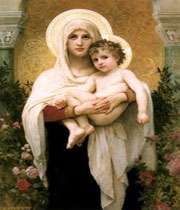
|
WHAT DO YOU KNOW ABOUT ISLAM?
YOU CAN IMPROVE YOUR OPINION . Islam is not a new religion, but the same truth that God revealed through all His prophets to every people. |


